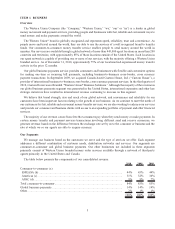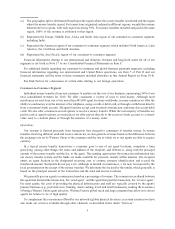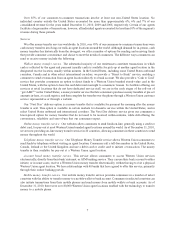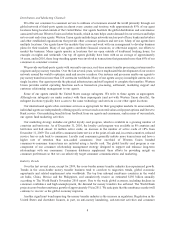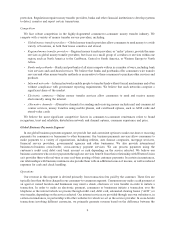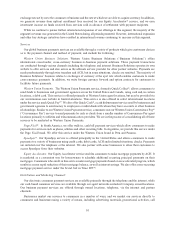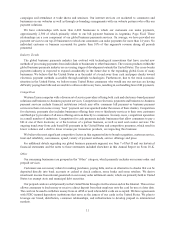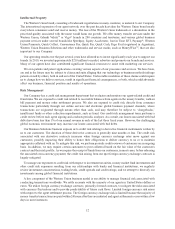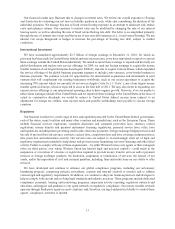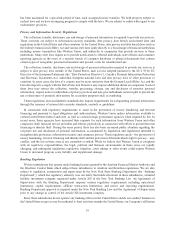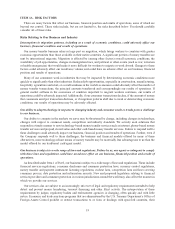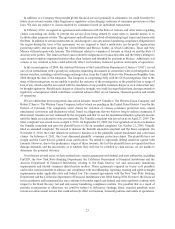Western Union 2010 Annual Report Download - page 17
Download and view the complete annual report
Please find page 17 of the 2010 Western Union annual report below. You can navigate through the pages in the report by either clicking on the pages listed below, or by using the keyword search tool below to find specific information within the annual report.required under the BSA described earlier. In most countries, either we or our agents are required to obtain licenses or
permits to offer money transfer services.
The Payment Services Directive (“PSD”), which became effective on November 1, 2009, has changed the
payments market in the European Union (“EU”), harmonizing the licensing and certain other requirements for
offering payment services within the EU. Previously, those requirements differed significantly among these
countries. The PSD also imposed new rules on payment service providers like Western Union. In particular,
the PSD makes us responsible for the regulatory compliance of our agents and their subagents in the EU who are
engaged by one of our payments institution subsidiaries which are regulated by Ireland and the United Kingdom.
The majority of our EU business will be managed through our PSD subsidiaries by April 2011. Thus, the risk of
adverse regulatory action against us because of the actions of our EU agents and their subagents has increased.
Under the PSD, we are subject to investment safeguarding rules and periodic examinations similar to those we are
subject to in the United States. These rules have resulted in increased compliance costs and may lead to increased
competition in our areas of service.
We have developed and continue to enhance global compliance programs to monitor and to address various legal
and regulatory requirements. Our money transfer network operates through third-party agents in most countries,
and our legal and practical ability to control those agents’ compliance activities is limited. To assist in managing and
monitoring money laundering and terrorist financing risks, we have developed and continue to enhance our global
compliance programs, including an anti-money laundering compliance program comprising policies, procedures,
systems and internal controls. We have employees in a number of our offices around the world dedicated to our
global compliance program efforts. In connection with an agreement and settlement with the State of Arizona and
other states entered into in February 2010, we have funded $71 million to a not-for-profit organization to promote
safety and security along the entire United States and Mexico border and to the State of Arizona for its costs
associated with this matter. This agreement and settlement also resolved all outstanding legal issues and claims with
the State. In addition, as part of the agreement and settlement, we have made and expect to make certain investments
in our compliance programs along the United States and Mexico border and we have engaged a monitor of those
programs. The costs of the investments and the monitor are expected to reach up to $23 million over the period from
signing to 2013. See also Item 1A, Risk Factors—“Western Union has been the subject of class-action litigation,
and remains the subject of other litigation as well as consent agreements with or enforcement actions by regulators”
for more information on this agreement and settlement.
Government agencies both inside and outside the United States may impose new or additional rules on money
transfers affecting us or our agents, including regulations that:
• prohibit transactions in, to or from certain countries, governments and individuals and entities;
• impose additional identification, reporting or recordkeeping requirements;
• limit the types of entities capable of providing money transfer services or impose additional licensing or
registration requirements;
• impose minimum capital or other financial requirements on us or our agents and their subagents;
• limit or restrict the revenue which may be generated from money transfers, including transaction fees and
revenue derived from foreign exchange;
• require enhanced disclosures to our money transfer customers;
• require the principal amount of money transfers originated in a country to be invested in that country or held
in trust until they are paid; or
• limit the number or principal amount of money transfers which may be sent to or from the jurisdiction,
whether by an individual, through one agent or in aggregate.
Escheat Regulations
Our Company is subject to unclaimed or abandoned property (escheat) laws in the United States and abroad.
These laws require us to turn over to certain government authorities the property of others held by our Company that
15


